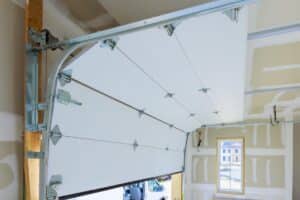When it comes to your home’s garage, the door is more than just an entry point; it’s a crucial element that can greatly impact your home’s curb appeal, security, and energy efficiency. With a plethora of options available in the market, choosing the right garage door material can be overwhelming.
This article aims to simplify the decision-making process by explaining the different materials available, such as steel, wood, and aluminum. By the end of this article, you’ll have a better understanding of these options and be equipped to make an informed choice for your home.
Steel Garage Doors: Strength and Durability
Steel garage doors are renowned for their durability and strength. They are excellent at withstanding harsh weather conditions, making them a top choice for homeowners living in regions with extreme weather. Steel doors are also low maintenance and can be insulated for energy efficiency.

The sturdy construction of steel makes it difficult for intruders to breach, providing you with peace of mind. Moreover, steel doors can be customized to match your home’s style, ensuring both strength and aesthetics. Whether you prioritize security, durability, or a combination of both, steel garage doors are a versatile and dependable choice for your home.
Wood Garage Doors: Timeless Elegance with Maintenance Considerations
When it comes to wood garage doors, their timeless elegance adds a touch of sophistication to any home. The natural beauty of wood complements various architectural styles, providing a warm and inviting aesthetic.

These doors can become a focal point of your home’s exterior, enhancing its overall curb appeal. However, it’s important to note that wood doors demand dedicated maintenance efforts to preserve their beauty and prevent issues like rot and warping. For homeowners who appreciate the unparalleled charm of wood and are committed to regular upkeep, this material offers a captivating choice that can elevate the visual appeal of their property.
Aluminum Garage Doors: Sleek and Lightweight
In the realm of garage doors, aluminum doors are celebrated for their contemporary elegance and lightweight design. Their sleek, modern appearance can effortlessly enhance the overall aesthetic of your home’s exterior.

Aluminum doors boast excellent resistance to rust and corrosion, rendering them an ideal choice for coastal regions where the air is laden with moisture. While they may not match the sheer strength of steel, aluminum garage doors still offer commendable durability, especially when paired with proper insulation, ensuring energy efficiency. If you’re seeking a garage door that combines style with practicality, aluminum could be a smart choice for your home.
Comparing Garage Door Materials: Pros and Cons
To make an informed decision, let’s compare the pros and cons of steel, wood, and aluminum garage doors:
Steel Garage Doors:
- Pros:
- Exceptional durability
- Low maintenance
- Energy-efficient when insulated
- Wide range of design options
- Cons:
- Susceptible to dents
- Prone to rust without proper maintenance
Wood Garage Doors:
- Pros:
- Timeless, elegant appearance
- Customizable designs
- Excellent insulation properties
- Can be stained or painted to match your home
- Cons:
- High maintenance requirements
- Susceptible to rot and warping without proper care
Aluminum Garage Doors:
- Pros:
- Modern, sleek appearance
- Lightweight and easy to operate
- Resistant to rust and corrosion
- Good insulation when insulated
- Cons:
- Not as durable as steel
- Limited design options
Factors to Consider When Choosing a Garage Door Material
Several factors should influence your decision when selecting a garage door material:
- Climate: Consider your local weather conditions and how they may affect your garage door.
- Budget: Determine how much you are willing to invest in a new garage door.
- Aesthetics: Choose a material that complements your home’s style.
- Maintenance: Assess how much time you can dedicate to maintaining your garage door.
- Insulation: Think about energy efficiency and whether insulation is necessary.
- Security: Consider the security features of different materials.
- Environmental Impact: Reflect on the sustainability of your chosen material.
Finding the Perfect Style to Match Your Home
Selecting the ideal garage door goes beyond functionality; it’s about harmonizing your home’s overall aesthetic. The perfect garage door should be an extension of your home’s architectural style, seamlessly blending in to enhance its curb appeal. Fortunately, the world of garage doors offers a diverse array of designs to cater to every taste and architectural theme.

For those with modern homes characterized by clean lines and minimalist features, contemporary garage doors with sleek, understated designs can complement the architecture beautifully. These doors often feature smooth surfaces and minimal embellishments, creating a seamless integration with the overall modern aesthetic.
Traditional homes, with their timeless charm and classic details, pair wonderfully with carriage-style garage doors. These doors evoke a sense of nostalgia with their rustic, barn-like appearance and decorative hardware. They add character and warmth to traditional homes, making them stand out in the neighborhood.
If you reside in a rustic or country-style home, consider opting for garage doors that exude a natural, earthy feel. Wooden garage doors with rich textures and earthy tones can enhance the rustic appeal of your home, creating a warm and inviting ambiance.

There are countless other design options available, such as contemporary garage doors featuring glass panels for a touch of modernity and elegance. The key is to explore the diverse styles and find the one that resonates most with your home’s unique personality.
Finding the perfect style to match your home involves a blend of aesthetics, functionality, and personal preference. By carefully considering your home’s architectural style and exploring the wide range of garage door designs available, you can select a door that not only complements your home but also adds to its overall charm and character.
Garage Door Insulation: Energy Efficiency Matters

The role of insulation in your garage door cannot be overstated, especially when it comes to energy efficiency. An insulated garage door serves as a formidable barrier against the elements, helping to maintain a consistent temperature inside both your garage and home.
One of the primary benefits of garage door insulation is its ability to curtail energy loss. Without proper insulation, your garage can become a source of unwanted heat exchange, allowing hot air to infiltrate during the scorching summer months and chilly drafts to seep in during the winter. This can wreak havoc on your home’s heating and cooling systems, leading to increased energy consumption and higher utility bills.

By investing in an insulated garage door, you create a buffer that significantly reduces the transfer of heat and cold, making your home more energy-efficient. It keeps your garage and the adjacent living spaces at a comfortable temperature year-round, ensuring that you don’t have to overwork your HVAC system to maintain ideal conditions.
Additionally, an insulated garage door contributes to a more comfortable and usable space within your garage. Whether you use your garage as a workshop, storage area, or simply want to keep your vehicles at a consistent temperature, insulation plays a crucial role in achieving these goals.
When selecting your garage door material, be sure to consider insulation options. Many garage doors offer insulation choices that cater to varying levels of insulation needs. The insulation material is often sandwiched between the door’s layers, providing a thermal barrier that enhances your home’s energy efficiency.
Don’t underestimate the importance of garage door insulation in maintaining an energy-efficient and comfortable home. It not only reduces energy loss but also contributes to the usability of your garage space. When shopping for a garage door, take the time to explore insulation options to ensure you make a choice that aligns with your energy-saving goals and enhances your overall home comfort.
Maintenance and Longevity of Garage Door Materials
Maintaining the longevity of your garage door is a prudent investment that can save you both time and money in the long run. The level of maintenance required varies depending on the material of your garage door, with steel and aluminum doors generally demanding less upkeep compared to their wooden counterparts.

Steel and Aluminum Doors: These garage door materials are celebrated for their durability and resilience. They are naturally less susceptible to issues like rot or warping, which are common concerns with wood. To keep your steel or aluminum garage door in optimal condition, regular maintenance typically involves periodic cleaning to remove dirt and debris, lubricating moving parts such as hinges and rollers, and checking for any signs of wear and tear. A well-maintained steel or aluminum door can provide reliable service for many years.
Wooden Doors: Wooden garage doors, while renowned for their timeless charm, necessitate more intensive care to maintain their beauty and functionality. Regular maintenance for wooden doors includes inspecting for signs of moisture damage, applying protective coatings or sealants to prevent rot, and ensuring that the door remains properly balanced and aligned. Failure to address these maintenance needs can lead to issues like warping, cracking, and a shortened lifespan.

It’s worth noting that regardless of the garage door material, routine maintenance can significantly extend its longevity and performance. Neglecting maintenance can lead to costly repairs or premature replacement, making it essential to include garage door care as part of your home maintenance routine.
The key to maximizing the lifespan of your garage door lies in consistent maintenance. Whether you have a steel, aluminum, or wooden garage door, regular upkeep can help ensure that it continues to serve its purpose efficiently and remains an asset to your home for years to come.
Budget Considerations: What Can You Afford?
Your budget plays a crucial role in your choice of garage door material. While steel doors are often cost-effective, wood doors tend to be pricier due to their aesthetics. Aluminum doors offer a middle-ground option, balancing cost and style.
Steel Doors: Steel garage doors often emerge as a cost-effective choice for budget-conscious homeowners. They offer a durable and reliable solution without breaking the bank. Steel doors come in a variety of designs, allowing you to find an option that not only fits your budget but also complements your home’s style. This affordability makes steel doors a popular choice among those looking for a balance between cost and performance.
Wood Doors: On the other end of the spectrum, wood garage doors are renowned for their aesthetic appeal and timeless elegance. However, their beauty typically comes at a higher price point. The craftsmanship and natural wood materials involved in creating wooden doors contribute to their elevated cost. Homeowners who prioritize aesthetics and are willing to invest in the classic charm of wood often find the expense justified.
Aluminum Doors: Aluminum garage doors occupy a middle ground when it comes to budget considerations. They strike a balance between affordability and style, making them an appealing option for many homeowners. Aluminum doors are known for their sleek, modern appearance and durability. They are often more budget-friendly than wood while offering a more sophisticated look compared to some steel models. This versatility in pricing and style positions aluminum doors as a practical choice for those looking to make a budget-conscious decision without compromising on aesthetics.

Your budget is a crucial factor that can guide your choice of garage door material. Whether you opt for the affordability of steel, the classic elegance of wood, or the budget-friendly sophistication of aluminum, it’s essential to strike a balance between cost and your desired style. By aligning your budget with your garage door preferences, you can make a choice that not only fits your financial plan but also enhances the overall appeal and functionality of your home.
Making an Informed Choice for Your Garage Door
Choosing the right garage door material is a significant decision that impacts your home’s appearance, functionality, and energy efficiency. By considering factors such as climate, budget, aesthetics, and maintenance, you can make an informed choice that aligns with your needs and preferences. Your garage, your choice!
FAQs
The best material depends on your needs—steel offers durability, wood provides elegance, and aluminum delivers a sleek, lightweight design.
Yes, steel garage doors are known for their strength and low maintenance, making them a reliable choice for long-term durability.
Yes, wood garage doors require regular maintenance, such as sealing and cleaning, to prevent warping or rot.
Aluminum doors are lightweight, rust-resistant, and ideal for modern homes, especially in coastal regions.
Steel doors are durable, low maintenance, energy-efficient when insulated, and come in a wide variety of designs.
Wood garage doors are high-maintenance and susceptible to warping and rot without proper care.
Yes, aluminum garage doors can be insulated to enhance energy efficiency.
Consider factors such as climate, budget, aesthetics, maintenance, and energy efficiency when choosing the right material.
Insulated garage doors help reduce energy loss, maintain indoor temperatures, and improve energy efficiency.








